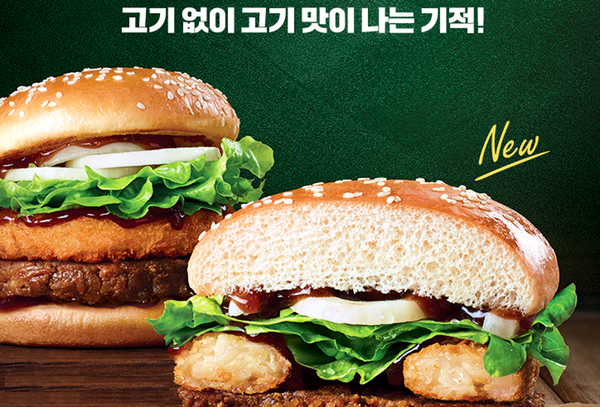
By Sunny Um WIRED Korea
Lotteria, a Korean fast-food chain owned by Lotte Corp., has recently launched a plant-based burger for vegetarians -- the first by a Korean mainstream fast-food company. But being plant-based doesn’t always mean being vegan-friendly, as is the case involving Lotteria.
Their plant-based burger, the “Ria Miracle Burger,” which is available at most Lotteria joints, consists of a “veef” patty drizzled with soy sauce, a fried onion-tapioca ring, lettuce and buns on the top and the bottom.
Before its official launch on February 13, Lotteria had its pilot burger tested at several stores last June after a year-long period of development. It received some negative feedbacks from customers, who complained about the buns and sauce not being free of meat or animal by-products.
The buns were made with eggs and milk, and the sauce was made with beef extract. But now the Ria Miracle Burger’s patty, onion rings, sauce, and burger buns are all free of meat or animal by-products. In addition, chips that go with the burger are fried with vegetable oil.
When Lotteria decided to launch a plant-based burger, what it apparently had in mind was an emerging trend of eating vegan food in Korea, which a vegan-food advocate said was fueled by a growing concern for animal rights and environmental protection.
“These days, a growing number of Koreans are interested in plant-based burgers,” says an official of the product development team at Lotteria. “Our new burger would be good for those who eat and have started to eat plant-based food.”
Not eating meat is an international fad. Vegan food is widely popular in Europe and the United States, and plant-based burgers are gaining a foothold, in particular in the United States. Beyond Burger, the first plant-based burger in the world is currently available at upscale restaurants and dining chains such as T.G.I. Fridays in the United States. Its strong competitor, Impossible Burger, is also gaining popularity in the United States.
Customers have mixed reactions about the patty. Reeju, a Twitter user, wrote: “It tasted good. The plant-based patty was even chewier than other meat patties available at Lotteria.” But Seo Jeong-yun, a Seoul-resident, says the patty did not taste like beef at all, adding that its texture was quite rubber-like.
A middle-aged woman, who owns three Lotteria joints, also agrees that the patty does not taste like real beef. Yet, she maintains it is good for health, adding, “But it is good for our chain to serve this type of plant-based burger.”
However, plant-based burgers are not always healthier than meat burgers. Plant-based burgers often are processed with a “long list of ingredients,” some of which are not good for health, to imitate the taste of the meat patty. As women's magazine Good Housekeeping reported, a Beyond Burger is made with tens of ingredients including chemicals like methylcellulose and potassium chloride.
Details about the recipe of the Ria Miracle Burger’s patty are not made public. The only ingredient known is the wheat protein, gluten, which Lotteria says it uses to imitate the texture of beef.
Instead, a Lotteria official leaves customers confused when she says, “The patty is made with protein from wheat but it doesn’t mean it is made with only plants. So we prefer to describe our Ria Miracle Burger patty as meatless rather than plant-based.” She refused to elaborate.
The Ria Miracle Burger may not be classified as vegan, given that it is cooked on the same assembly line with non-vegan foods. This should be a matter of concern to vegans. Probably for this reason, Lotteria avoids labeling the burger as entirely plant-based.
To prevent any misunderstanding, the fast-food chain calls on its employees to make it clear to customers that the Ria Miracle Burger shares the same assembly lines with its meat-based products. The company also avoids advertising their burgers as being plant-based, probably because of the “potential cross-contamination” in the cooking process.
Its target customers do not include strict vegans. “The Ria Miracle Burger targets non-vegetarians and flexitarians (semi-vegetarians) in Korea,” says an official of Lotteria.
Lotte Corp. has not applied to obtain the vegan food certificate for the Ria Miracle Burger patty from the Korea Agency of Vegan Certification and Services (KAVCS), as it did previously for its frozen food series of plant-based chicken nuggets and pork cutlets.
“As it didn’t apply for the certificate, KAVCS cannot say whether the Ria Miracle Burger is vegan or not,” says an official of KAVCS. “Also, we don’t exactly know how the burger is made and what it is made with.”
Amid concerns, some people see Lotteria’s latest invention of the plant-based burger as a good start of vegetarian fast foods in Korea. A vegetarian Twitter user Areum wrote: “As a person who loves hamburgers so much, I am so happy that I have another option. Now I can eat out with no problem.”
와이어드 코리아=Sunny Um Staff Reporter
sunny@wired.kr
저작권자 © WIRED Korea 무단전재 및 재배포 금지
와이어드 코리아=Sunny Um Staff Reporter
sunny@wired.kr
저작권자 © WIRED Korea 무단전재 및 재배포 금지
이 기사를 공유합니다


 뉴스레터 신청
뉴스레터 신청